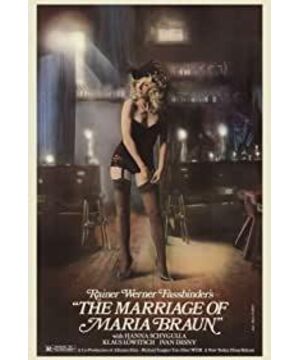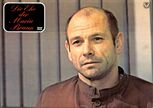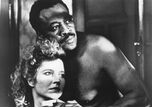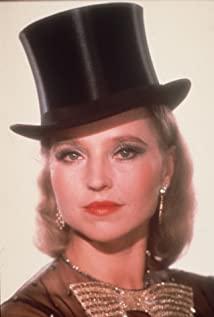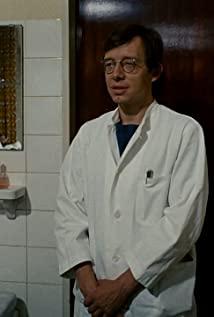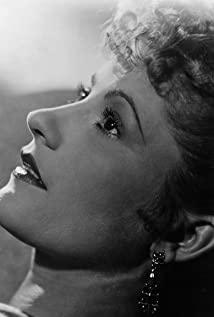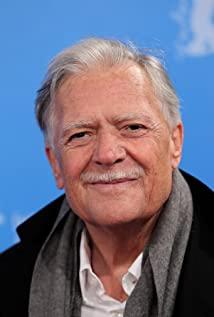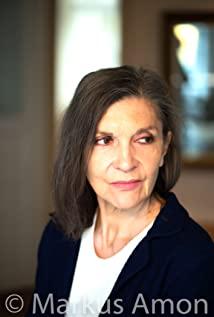With a dejected rather than euphoric attitude toward the past and present, Fassbender produced The Marriage of Maria Braun. He transplanted all his political, social and emotional fantasies into Maria, a character that was given maximum action like never before.
In an interview, the reporter asked Fassbender to choose among the self-categorization of democrats, tyrants, Christians, anarchists, liberals and conservatives, and Fassbender did not hesitate to choose to be a romantic An anarchist, he was obsessed with projecting his personal expectations of society onto the screen. Her most well-known female trilogy "Maria Braun's Marriage", "Lola", and "The Desire of Veronica Foss" are all based on the historical experience of female characters, and they are based on the historical experience of women's characters. The political and social historical reflection of Germany. Dating back to his first short film, Urban Wanderer, in 1965, Fassbender's films have always focused on the repressed, exploited and exploited personal emotions within the survival system. "The country I live in is a country whose structure I reject at all. My generation has little knowledge of German history from school and home, so you naturally want to explore." With a sense of the past, Now dejected rather than cheered, Fassbender produced The Marriage of Maria Braun.
Spatially, Fassbender's filmmaking practice has always been in a state of constant flow. The early minimalist works represented by "Foreign Worker" were very cautious about the meaning of moving images. The characters often resisted the movement of the camera in a static passive resistance state, and the moving space of the camera could not promote the development of things. The character and the camera are in a state of escaping from each other. Later, in the melodrama represented by "Fear Devouring the Soul" and the completely unbridled camera operation of "Chinese Roulette", the camera's grasp of space tends to be a destined allegory. Crazy shuttle, around them to predict and judge without mercy. From "Maria Braun's Marriage", the dialectical tension of space has been balanced and extended. The two sets of movements of the character and the camera can each determine the possibility of each other, and the movement of the camera and the character are in the same style. transformed.
Fassbender once commented on the living conditions of the Germans after the war: people only followed the external trajectory, but did not really live in the times, or they lived by actions, but did not use their minds and hearts. experience life. However, Maria in "Maria Braun's Marriage" acted completely in a gesture of reality lagging behind his consciousness. "It's a bad ethos, but it suits me well, and nothing can affect me," she said. She completed the marriage registration with her husband during the war, and achieved material satisfaction in coordination with the development of the German economy after the war. She is more flexible than men. She tries to live in this era with her mind and adapt her expectations to it. Men are more involuntary than women in role-playing in this society. Women have their roles, but it's much easier to break out of roles or get off track. If it is a male, it will be immediately crowned with crimes such as desertion. So, Fassbender transplanted all the political, social and emotional fantasies into Maria, a character that was given the greatest amount of action that had never been seen before.
In the scene where Maria assists Oswald in negotiating business with the American businessman, the kinetic energy of the characters and the potential energy of the camera form a delicate dance. The whole negotiation is divided into two parts. The first half is a full and saturated long shot. Maria intervenes in the transactions between men as a translator. The camera movement and the center of space refer to the American businessman, who represents the power center of the negotiation. The American businessman draws from the left and draws from the right. Although Oswald, Hinkie Borg and Maria all move horizontally in the screen space, they are not dominant. When the negotiation entered the second half, the entire screen space was completely reversed. Maria was no longer just a translator, she began to become the center of the frame and the focus of the camera. She took the initiative to walk in front of the American businessman and turned her head to interrupt. Oswald's dialogue, which led to the scene's first editing cut, was of course not because of Fassbender's lack of moving tracks and imagination, but a burst of energy. Fassbender used Maria's close-up clips to advertise her "action power", and the previously saturated and anxious long-shot sequences must and only be released by Maria. The release of Maria's "action" is also reflected in the close-up of various material materials. Facing the shortage of materials during and after the war, Maria completed the transfer of value through continuous transactions, exchanging Camel cigarettes from American soldiers for her mother The brooch, and then the mother's brooch in exchange for dresses and drinks, and finally the English learned in bed in exchange for Oswald's favor. The camera sternly gives a close-up of the object of each transaction, and uses static potential energy to contact every kinetic energy that Maria sends out. Any intermediary can make Maria from scratch to full-fledged. The relationship between the character and the camera has always maintained an infinite tension, and the moving image and the still image have become a dialectical interaction.
Of course, Maria's extraordinary independence and freedom of action could not break the snares of love. She proved her remarkable ability to earn a living while her husband was in prison, and she was, in fact, very free. And when Oswald died and her husband reunited with her, she discovered that she had always been a pawn in the male world without her realizing it. The two men made an agreement behind her back: Hallman could not appear in front of Maria during Oswald's lifetime, so he could get half of Oswald's wealth. Maria has no disadvantage in her career, but she misestimates her dependence on the man she loves. In Fassbender's films, love only works when it doesn't work out. Interestingly, from another point of view, the expression of Maria's obstruction of action is the same as the release of action, which is completed through numerous close-ups. Twice Maria heard the news from her husband, and there were close-ups of fragmentation. The first time was when I heard that her husband had died on the battlefield. Her hands were motionless under the running water of the faucet. The huge grief was even more impermanent and powerless under the intermittent running water. The camera immediately switched to an extremely depressed group portrait. On the top, the family of four in the picture frame was blocked and arranged on a diagonal line. Maria's previous action release collapsed instantly, and the space could not be relieved, which would inevitably lead to stagnation and obstruction of action. The second time was when Maria finally learned of the deal behind Hallmark and Oswald. In an extreme close-up, it was still the grief of water cutting her wrist. The radio was playing the news of the World Cup victory in Germany, and the announcer shouted: "It's over! It's over! It's over! Germany is the world champion!" The contrast and frustration in the audio-visual language completed the final blow of the blocked action. Maria could not get her full expectation from the social situation on which the ideal depends. With her autonomy and mobility, she realizes that she has paid a huge price for survival and love.
View more about The Marriage of Maria Braun reviews


